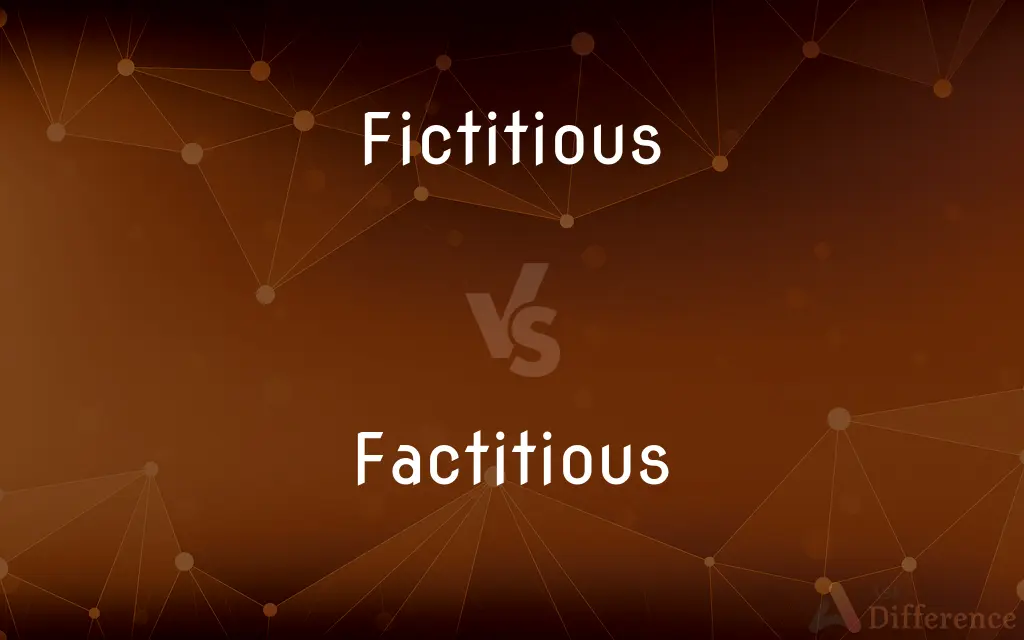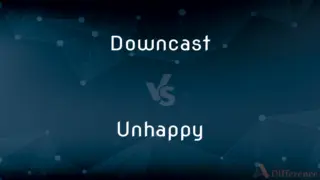Fictitious vs. Factitious — What's the Difference?
By Urooj Arif & Fiza Rafique — Updated on March 30, 2024
Fictitious refers to something created from the imagination, not real or true, while factitious is artificially created or fabricated, often with intent to deceive.

Difference Between Fictitious and Factitious
Table of Contents
ADVERTISEMENT
Key Differences
Fictitious is a term used to describe things that are imaginary or not real, often applied to stories, characters, or entities created from one's imagination. It emphasizes the aspect of being invented rather than based on fact or reality. In contrast, factitious specifically denotes something that is artificially created or fabricated, and it carries a connotation of being made for the purpose of deception or for creating a false impression.
While fictitious elements are commonly found in literature and art, serving as a product of creative expression, factitious elements might be present in various contexts where there is an intent to deceive, such as in the creation of false documents or in simulating a disease for a specific gain. The primary difference lies in the intent behind the creation; fictitious creations are not designed to deceive but to entertain, explore, or express, whereas factitious creations often have deception as their goal.
Fictitious names or entities can be used legally and harmlessly, such as pen names used by authors or hypothetical scenarios used in academic exercises. These serve functional or protective purposes without deceptive intent. On the other hand, factitious disorders involve intentionally produced or feigned physical or psychological symptoms, designed to assume the sick role and gain medical attention, reflecting a psychological need rather than an attempt at fraud in the conventional sense.
The distinction between the two also highlights different aspects of human creativity and psychology. Fictitious works are celebrated aspects of cultural and artistic expression, showcasing human imagination and the ability to conceptualize worlds beyond our reality. Factitious actions, however, underscore a complex interplay of psychological factors, ethics, and sometimes the desire to manipulate reality for various reasons.
In summary, while both fictitious and factitious involve elements that are not naturally occurring or real, the key difference lies in their purpose and context—fictitious is rooted in the realm of creativity and imagination, whereas factitious is anchored in the intent to fabricate or deceive.
ADVERTISEMENT
Comparison Chart
Definition
Created from imagination, not real or true.
Artificially created or fabricated, often with intent to deceive.
Intent
To entertain, explore, or express.
To deceive or create a false impression.
Common Uses
Literature, art, hypothetical scenarios.
False documents, simulated diseases.
Connotation
Neutral or positive, tied to creativity.
Negative, associated with deception.
Example Purpose
Using a pen name for anonymity or creative freedom.
Feigning illness to gain attention or sympathy.
Compare with Definitions
Fictitious
Rooted in imagination.
The story is set in a fictitious medieval kingdom.
Factitious
Involves manipulation of reality.
Creating a factitious history to boost credibility.
Fictitious
Imaginary or not real.
The novelist created a complex, fictitious world.
Factitious
Artificially created or fabricated.
The document was found to be factitious.
Fictitious
Not intended to deceive.
The author used a fictitious name for privacy.
Factitious
Often intended to deceive.
The factitious disorder involves simulating symptoms for attention.
Fictitious
Can be legally harmless.
Fictitious business names allow for branding flexibility.
Factitious
Can have psychological motivations.
Factitious behaviors may seek sympathy or care.
Fictitious
Used in creative expression.
Fictitious characters enrich the narrative.
Factitious
Ethically questionable.
Using factitious evidence in an argument undermines trust.
Fictitious
Not real or true; imaginary or fabricated
Reports of a deal were dismissed as fictitious by the Minister
Factitious
Produced artificially rather than by a natural process.
Fictitious
Occurring in or invented for fiction.
Factitious
Lacking authenticity or genuineness; sham
Speculators responsible for the factitious value of some stocks.
Fictitious
Concocted or fabricated, especially in order to deceive or mislead; make up
A fictitious name.
Fictitious transactions.
Factitious
Created by humans; artificial.
Fictitious
Of or relating to the characters, settings, or plots that are created for a work of fiction
A book in which fictitious characters interact with historical figures.
Factitious
Counterfeit, fabricated, fake.
Fictitious
Invented; contrived.
Factitious
Made by art, in distinction from what is produced by nature; artificial; sham; contrived; formed by, or adapted to, an artificial or conventional, in distinction from a natural, standard or rule; not natural; as, factitious cinnabar or jewels; a factitious taste.
He acquires a factitious propensity, he forms an incorrigible habit, of desultory reading.
Fictitious
Feigned; imaginary; not real; fabulous; counterfeit; false; not genuine; as, fictitious fame.
The human persons are as fictitious as the airy ones.
Factitious
Not produced by natural forces;
Brokers created a factitious demand for stocks
Fictitious
Formed or conceived by the imagination;
A fabricated excuse for his absence
A fancied wrong
A fictional character
Used fictitious names
A made-up story
Fictitious
Adopted in order to deceive;
An assumed name
An assumed cheerfulness
A fictitious address
Fictive sympathy
A pretended interest
A put-on childish voice
Sham modesty
Common Curiosities
Can a fictitious story become factitious?
If a fictitious story is presented as true with the intent to deceive, its elements could be considered factitious.
Why are factitious actions considered unethical?
Factitious actions are unethical because they involve deception, potentially harming others or exploiting systems for personal gain.
What is the main difference between fictitious and factitious?
Fictitious refers to something imaginary or not real, often used in creative contexts, while factitious implies artificial creation with an intent to deceive.
How can fictitious elements be beneficial?
Fictitious elements can enhance storytelling, stimulate imagination, and serve educational or therapeutic purposes.
What drives individuals to create factitious disorders?
Psychological needs, a desire for attention or sympathy, and underlying mental health issues can drive individuals towards factitious behaviors.
Are there ethical ways to use factitious elements?
Ethical use of factitious elements is challenging and context-dependent, as the intent is often to deceive.
Is fantasy the same as fictitious?
Fantasy is a genre that uses fictitious elements, but not all fictitious elements are part of the fantasy genre.
Are factitious disorders real illnesses?
Yes, factitious disorders are recognized psychological conditions where individuals deliberately produce or exaggerate symptoms for psychological reasons.
How do societies view fictitious vs. factitious behaviors?
Societies generally appreciate fictitious creations in art and literature, whereas factitious behaviors are frowned upon due to their deceptive nature.
Can factitious elements be found in legal contexts?
Yes, factitious elements, such as forged documents, are considered fraudulent in legal contexts.
Can a name be both fictitious and factitious?
A name could be fictitious if used as a pen name without deceptive intent, but factitious if used to create a false identity for deceptive purposes.
Do fictitious works have real-world impact?
Yes, fictitious works can influence culture, inspire innovation, and provoke thought and discussion.
What role do fictitious and factitious elements play in education?
Fictitious elements can be used for illustrative and teaching purposes, while factitious elements, if uncovered, can serve as ethical case studies.
How do creators distinguish between fictitious and factitious?
Creators distinguish based on intent; fictitious is for creative expression without deceiving, while factitious involves deliberate fabrication for deception.
Can factitious behavior be treated?
Yes, with psychological counseling and treatment, individuals exhibiting factitious behaviors can be helped.
Share Your Discovery

Previous Comparison
Rubbish vs. Dustbin
Next Comparison
Downcast vs. UnhappyAuthor Spotlight
Written by
Urooj ArifUrooj is a skilled content writer at Ask Difference, known for her exceptional ability to simplify complex topics into engaging and informative content. With a passion for research and a flair for clear, concise writing, she consistently delivers articles that resonate with our diverse audience.
Co-written by
Fiza RafiqueFiza Rafique is a skilled content writer at AskDifference.com, where she meticulously refines and enhances written pieces. Drawing from her vast editorial expertise, Fiza ensures clarity, accuracy, and precision in every article. Passionate about language, she continually seeks to elevate the quality of content for readers worldwide.















































